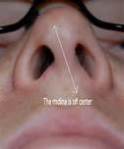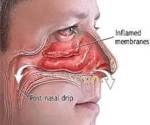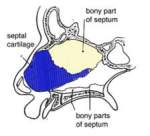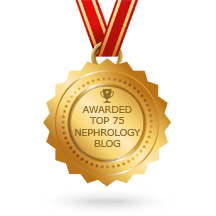My father had a deviated septum. My daughter has a deviated septum. Why don’t I have a deviated septum? Oh right, I’m the lucky one. I only have Chronic Kidney Disease… not that the two are mutually exclusive… or that it’s lucky to have CKD.
When it was my father’s turn, I was too young to know anything except that my dad was gone over night. I didn’t like that. Now I ask my daughter loads of questions. I don’t like that either.
So here I am very ahead of myself and not giving you a clue as to what a deviated septum is. Septum comes from the Latin saeptum, which means “a fence, enclosure, partition.” (Thank you my old academia friend Etymology Online at http://www.etymologyonline.com/index.php?term=septum.) We still use that word for the dividing membrane in the nose.
Feel the rigid cartilage under the skin on the outside of your nose. Inside are two chambers separated by the – what else? – septum. Deviated means exactly what you think it does: turned aside. Sometimes you can see the results of a deviated or turned aside septum by looking at a person’s nostrils. If one is large and the other very small, it’s likely they have a deviated septum.
Sometimes people are born with them, but 80% of the time, they’re caused by accidents of one kind or another, or even growing older. Sometimes people don’t even know they have a deviated septum. Sometimes it doesn’t even matter.
 But when you start to experience frequent sinusitis and nosebleeds, it does start to matter. According to The Mayo Clinic at: http://www.mayoclinic.org/diseases-conditions/deviated- septum/basics/definition /con-20031537
But when you start to experience frequent sinusitis and nosebleeds, it does start to matter. According to The Mayo Clinic at: http://www.mayoclinic.org/diseases-conditions/deviated- septum/basics/definition /con-20031537
“When a deviated septum is severe, it can block one side of your nose and reduce airflow, causing difficulty breathing. The additional exposure of a deviated septum to the drying effect of airflow through the nose may sometimes contribute to crusting or bleeding in certain individuals.”
Some of the symptoms are: preferring to sleep on one side since that allows the larger nostril to get the most air, noisy breathing, the above mentioned nosebleeds and frequent bouts of sinusitis. Wait, sinusitis? According to Canada.com at http://bodyandhealth.canada.com/channel_section_details.asp?text_id=5694&channel_id=1020&relation_id=70842
“The narrowed nasal passageway caused by a deviated septum can cause mucus to become blocked by preventing the drainage of mucus from a sinus into the nasal cavity. Excess mucus inside the sinuses presents an attractive environment for bacteria, leading to a sinus infection. This in turn causes inflammation of the sinuses (sinusitis), and because it can happen regularly, chronic sinusitis can occur.”
 Oh, my poor daughter! Frequent nosebleeds, chronic sinusitis, their accompanying post-nasal drip, and headaches. Oh yes, headaches. As I understand it, fluid (can’t drain properly due to that deviated septum, remember?) builds up in the sinuses and exerts pressure. Result: headache.
Oh, my poor daughter! Frequent nosebleeds, chronic sinusitis, their accompanying post-nasal drip, and headaches. Oh yes, headaches. As I understand it, fluid (can’t drain properly due to that deviated septum, remember?) builds up in the sinuses and exerts pressure. Result: headache.
This sounds pretty bad, but there are ways of dealing with a deviated septum.Keep in mind that some people have a mildly deviated septum so they don’t do anything for it. Others are troubled by the deviated septum and use medications such as decongestants, nasal sprays, or antihistamines. But when the symptoms are affecting your life and health, surgery is usually suggested. The following is from MedicineNet at http://www.medicinenet.com/deviated_septum/page2.htm
“If a person has a deviated septum and it causes breathing problems or sleep apnea and snoring, surgery may be recommended to repair the septum. Surgery to fix a deviated septum is called a septoplasty, submucous resection of the septum, or septal reconstruction.”
Did you notice that this surgery is sometimes necessary so that the sleep apnea – which may be caused by your deviated septum – can be cured? That’s how it affects us as CKD patients. We already have enough problems without sleep apnea! Diabetes, cardiovascular illness, mortality may all be connected to a deviated septum as we know from a recent blog that quoted EurekAlert at http://www.eurekalert.org/pub_releases/2014-04/elf-sal040214.php.
“Sleep apnoea has been linked with elevated blood sugar levels, suggesting people with the condition could be at an increased risk of cardiovascular illness and mortality.
The findings of a new study, published online today (3 April 2014) in the European Respiratory Journal, add to a growing body of evidence that suggests that sleep apnoea is linked with diabetes.”
 Your medical condition is simply not as, well, simple as you think with CKD. Deviated septum may lead to sleep apnea, which may lead to diabetes, or any of the other outcomes listed above.
Your medical condition is simply not as, well, simple as you think with CKD. Deviated septum may lead to sleep apnea, which may lead to diabetes, or any of the other outcomes listed above.
Okay, we’re ready to take a look at the surgery now. I found this at http://deviated-septum.net/deviated-septum-symptoms-diagnosis-and-treatment/ via a simple Yahoo search.
“Septoplasty is the surgical treatment which is preferred by doctors worldwide to correct a deviated septum. The surgery is done entirely through the nostrils, thus no external bruising occurs. During the surgery the portion of the septum which are [sic] extremely deviated will be re-adjusted or realigned or removed completely.”
Sometimes people do have a nose job (rhinoplasty) at the same time. This completely changes the shape of the nose. But let’s not judge here; maybe the adjustments made to the deviated septum would make the appearance of the finished product unacceptable to the patient.
I wish my daughter and everyone else who needs this procedure well. She’s got a pretty nose. I like the idea that she should be able to adequately breathe through it after her surgery… and may be cured of her headaches, sinusitis, nosebleeds, and sleep apnea.
News: the Medicare monthly magazine has profiled me for an upcoming issue. I have no idea when it’ll be out, but I’ll tell you as soon as I know.
I’m wondering why, if my advocacy for Chronic Kidney Disease Awareness is so important that I’m being profiled by newspapers, interviewed on radio shows, and have so many readers for the blog, SlowItDown isn’t getting more calls to bring free ckd education by trained educators into the community. Suggestions for speeding up SlowItDown (love that juxtaposition), anyone?
Thank you all for keeping the book moving out of the stores and into your loved ones’ lives. After reading about the deviated septum, I donated a copy to the pulmonologist I saw for my own sleep apnea today.
Until next week,
Keep living your life!



Leave a comment